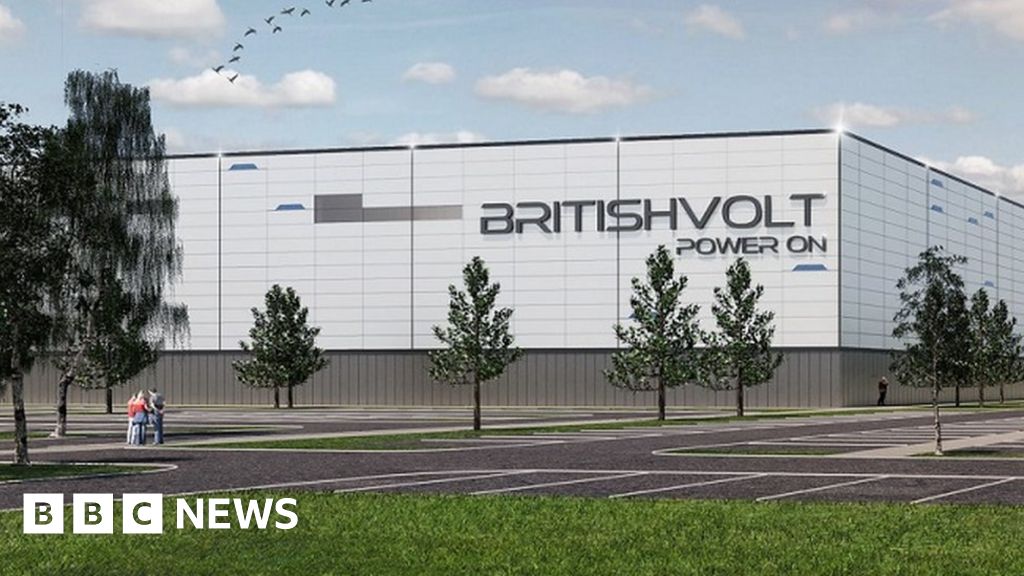Britishvolt Hopes For Last-minute Bid To Stave Off Collapse

There are hopes that a last-minute bid for Britishvolt, which plans a factory to make electric car batteries, may prevent it falling into administration.
The potential new bidder was described as "a British consortium", according to people familiar with the matter.
The financially troubled manufacturer held a management meeting today and has moved an all-staff meeting to Tuesday.
Shareholders have been voting on who will take over the project to build a £4bn battery plant in Northumberland.
There had been two existing bids for the project in the Port of Blyth - one from an investment group with links to Indonesia, with a dormant UK subsidiary and no track record in manufacturing, and one from a rump of small existing investors keen to avoid seeing the value of their shares totally wiped out.
It is thought a buyout would cost around £30m.
If none of the bidders can secure support from 75% of shareholders, the company would be left drained of cash and heading for an administration it only narrowly avoided at the end of last year after an emergency lifeline was extended by one of its investors, the commodity trading giant Glencore.
Industry watchers have expressed dismay at the fact that a plant considered absolutely vital to the future of car making in this country should be hanging in the balance this way.
The plant was also seen as meeting the government's levelling up agenda to create prosperity in places like Northumberland, and one that will help secure more resilient supply chains within the UK.
Even if this new bidder is successful, there are still doubts that prospective customers would be prepared to place orders for prototype battery technology with a company with no track record.
Privately, people close to the situation have expressed surprise and frustration that the government has not taken a more active role in shaping the outcome of such a crucial project.
Other bidders?
Last year, Britishvolt asked the government to advance £30m of a promised £100m in support, but was refused as the company had not hit agreed construction milestones to access the funds.
The BBC understands that request was followed by another for £11.5m, then just £3m. Government sources say that sowed seeds of profound doubt over the viability of the company.
Some in government have expressed a preference for the company in its current form to collapse into administration so that more serious players can take the project on.
Candidates that have been mentioned include Tata, the Indian parent of Jaguar Land Rover, Chinese firm Envision which owns the UK's only existing battery plant in Sunderland for the exclusive use of Nissan, and a potential Korean manufacturer.
While efforts to get cracking on this crucial plant flounder, there are 35 battery plants in various stages of construction in the EU.
It begs the question whether the UK has - or needs - an industrial strategy.
Former Business Secretary Greg Clark put in place a strategy back in 2016 despite the Conservative Party being historically sceptical of the notion of overt government involvement in the private sector.
The term was seen as synonymous with "picking winners" and was all but banned when Kwasi Kwarteng took over at the Department for Business, Energy & Industrial Support (Beis) and subsequently the Treasury.
But Mr Clark said at the time that the government did not need to pick winners but ask strategic questions, such as - are we going to need more batteries, satellites, pharmaceuticals etc?
It also needed to shape support via grants and tie-ups with academic and industrial institutions in sectors at which the UK excelled and would need in the economy of the future.
Insiders at Beis now say they are not working to any particular plan. Of the current situation at Britishvolt, one said, "if they can raise capital privately then they should be allowed to do that", while stressing that government help of £100m was still available to whomever hit specific construction milestones.
Meanwhile the clock is ticking. By 2026, the vast majority of a car's value will have to be sourced in the UK or the EU to qualify for tariff-free export to the EU, where most UK-made cars are sold.
More positively, it seems that everyone agrees that the site in Blyth is perfect for a plant. There is broad industry and political support for it to go ahead and it is expected to happen when serious players get involved.
However, industry experts say the UK will need at least four battery plants to support domestic car making, and for now they are looking on with despair and frustration at the chaotic developments at Britishvolt.
From Chip War To Cloud War: The Next Frontier In Global Tech Competition
The global chip war, characterized by intense competition among nations and corporations for supremacy in semiconductor ... Read more
The High Stakes Of Tech Regulation: Security Risks And Market Dynamics
The influence of tech giants in the global economy continues to grow, raising crucial questions about how to balance sec... Read more
The Tyranny Of Instagram Interiors: Why It's Time To Break Free From Algorithm-Driven Aesthetics
Instagram has become a dominant force in shaping interior design trends, offering a seemingly endless stream of inspirat... Read more
The Data Crunch In AI: Strategies For Sustainability
Exploring solutions to the imminent exhaustion of internet data for AI training.As the artificial intelligence (AI) indu... Read more
Google Abandons Four-Year Effort To Remove Cookies From Chrome Browser
After four years of dedicated effort, Google has decided to abandon its plan to remove third-party cookies from its Chro... Read more
LinkedIn Embraces AI And Gamification To Drive User Engagement And Revenue
In an effort to tackle slowing revenue growth and enhance user engagement, LinkedIn is turning to artificial intelligenc... Read more

